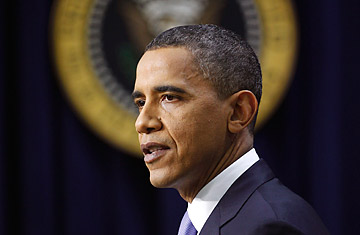
President Obama on Wednesday.
The New START treaty ratified by a 71-26 vote in the Senate Wednesday will yield practical results in the coming months, such as renewed inspections of Russian nuclear sites and a reduction in deployed warheads. But the symbolic effects of ratification may be more important for President Barack Obama and the Democrats in the short term.
Passing New START caps a surprisingly effective lame-duck session for Obama, giving him a post-midterm political boost and adding a bipartisan foreign policy win to his largely partisan domestic legislative victories. Political wins can be evanescent, but with New START and his other post-midterm victories, Obama begins a two-year search for re-election with unexpected momentum.
The nuclear treaty's inspection provisions were perhaps the strongest argument for ratification. They will restart the mutual U.S.-Russian nuclear facility visits that provide crucial intelligence for American analysts on the state of the Russian arsenal, and further diminish the likelihood of conflict by strengthening confidence between the two former Cold War rivals. The treaty's reduction in deployed warheads also modestly lowers the overall number of deployed nuclear weapons.
Obama has also claimed that the treaty sends an important message abroad. Even during his time in the Senate, the President argued that the best way to prevent the proliferation of nuclear weapons was to rebuild confidence in international agreements on nuclear weapons. The centerpiece agreement, the Non-Proliferation Treaty (NPT), ties the undertaking to prevent new countries obtaining nuclear weapons to a commitment by existing nuclear powers to give up those weapons. New START is intended as a tangible step by the U.S. and Russia to show other countries that the big powers intend to keep their end of the deal. But it's questionable whether others, like Iran, North Korea, Pakistan and India — and most of the developing world — will believe that, even after New START. After all, the treaty still leaves each side fielding 1,550 warheads, with many more in reserve, and President Obama's commitment to a 10-year $85 billion plan to modernize the U.S. nuclear arsenal makes clear that disarmament won't be on the agenda for the foreseeable future. Also, it's not clear how many of the Republicans who voted for New START would also support other treaties designed to bolster the compact.
The treaty's domestic symbolism is more powerful. Obama's self-described mid-term "shellacking" led most observers to conclude that he would be unable to move any legislation in the lame duck session. But with the tax-cut deal that provides a stimulus to the economy just as recovery appears to be stalling, and the repeal of the ban on gays serving openly in the military, Obama notched up two big wins. Adding New START not only caps the lame duck, but does so in an area where the President has had few salable victories.
Obama has struggled to make progress on his signature foreign policy issue of the 2008 campaign, negotiating with Iran over its nuclear program. While he built an international consensus for new and surprisingly effective sanctions, Iran has not backed down. An increasingly belligerent North Korea continues to defy the international community, while Obama has failed to make headway on the Middle East peace effort he launched on his second day in office.
New START also gives Obama an achievement rare among Democratic presidents — arms-control treaties have tended to pass only when Republicans have been in the White House. Getting the treaty passed also represents a surprising out-maneuvering by the Administration of Jon Kyl, the Senate's second ranking Republican and a master of subterfuge. In 1999, Kyl tricked Democrats and the Clinton administration into bringing the long-sought Comprehensive (Nuclear) Test Ban Treaty to the floor of the Senate only to reveal that he had secretly lined up enough opposition to kill it.
This time, the Administration negotiated for months with Kyl only to find in the last days of negotiations that he still had fundamental problems with the treaty. But Obama had the last laugh, peeling off 13 Republicans whom Kyl had hoped would vote down the treaty. Long time arms-control advocates were particularly glad to see Kyl lose. "It is so sweet to see him go down in defeat today," said Joe Cirincione, a veteran of the Test-Ban Treaty fight and now head of the Ploughshares Fund.
Kyl's steadfast opposition only adds to Obama's appearance of momentum — the President's victory would appear less potent had Kyl negotiated a deal. Combined with the bipartisan support for the tax-cut deal, Obama begins what will inevitably be a contentious two-year relationship with Congressional Republicans by notching up two bipartisan wins.
